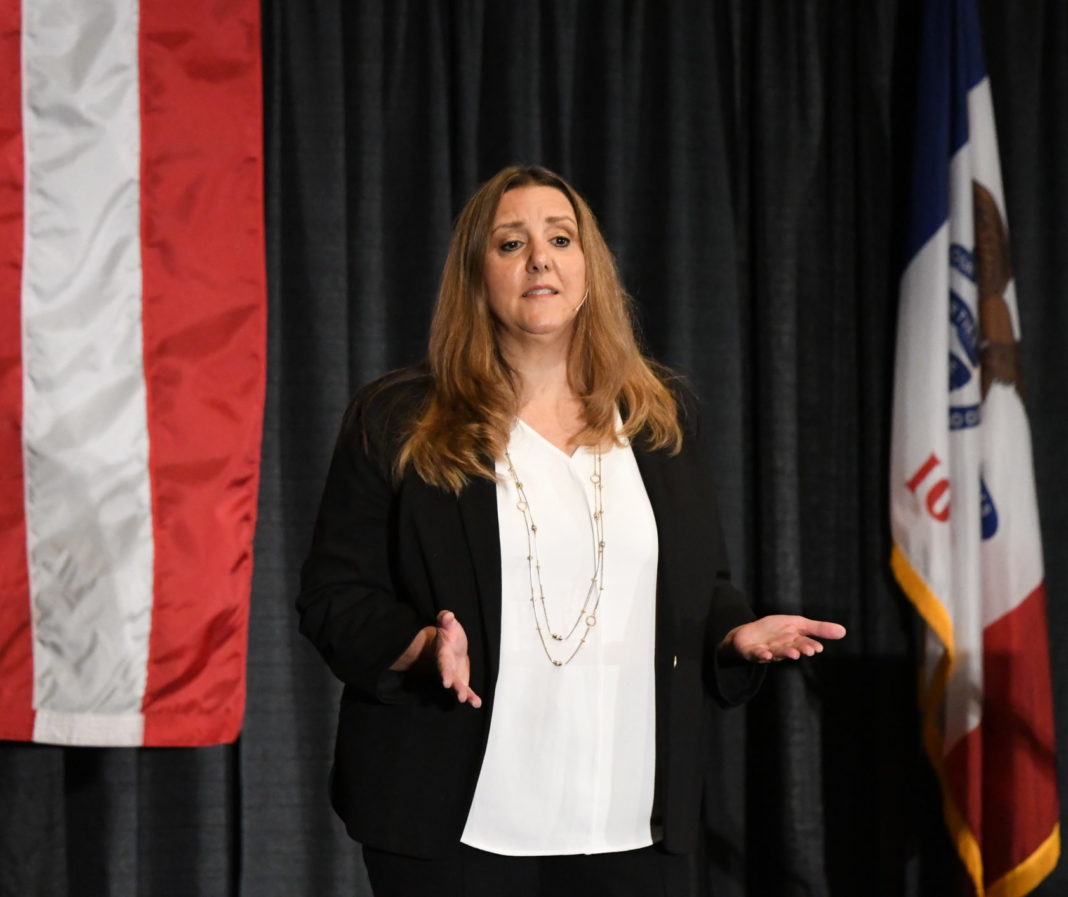Attendees at the Informed Conference 2020 hosted by Informed Choice Iowa learned a lot about vaccine policy across the country on Saturday. Dawn Richardson, the director of advocacy for the National Vaccine Information Center, started by telling the conference she didn’t expect to be where she is today.
“I promise you, I didn’t go to college thinking I was going to be a vaccine choice advocate,” she said.
After graduating from the University of Connecticut with an electrical engineering degree, she designed microprocessors for IBM. When she was pregnant with her first daughter, her mom shipped a baby book that included a serious reaction to vaccines for smallpox and the MMR.
“It started a conversation and a quest that has just gone on for 25 years now,” she said. “As we started looking into this, and my husband had some health issues as a kid, we realized that genetically we were a time bomb and that our kids could possibly be seriously hurt from vaccinations.”
At the time, Texas did not have philosophical or conscientious exemptions. The religious exemption was similar to Iowa’s today, which Richardson said is unconstitutional in that it requires you to attend a church that is opposed to vaccination.
“Well, those churches really don’t exist, and our U.S. Constitution allows you to be able to have personally held sincere religious beliefs,” she said. “So, here I was thinking, how am I going to save my kids? Well, I’ll just a medical exemption.”
To get a medical exemption, she needed a doctor to certify and say the vaccine would cause harm.
“Now we’re making doctors fortune tellers,” she quipped. “What about the possibility for harm? What about do no harm? What about being cautious? So, the law did not support me protecting my children.”
From there she went on a seven-year quest to change the Texas law and add a conscientious exemption. In 2003, Texas became the first state to add a philosophical or conscientious exemption.
The vaccine lobby is powerful and present in all 50 states, Richardson said. Whether it is the American Academy of Pediatrics, the American Medical Association, the pharmaceutical companies themselves, the public health chapters, she said all of them have paid lobbyists in addition to the government agencies that use our tax dollars to pay a lobbyist to “push forced vaccination laws.”
Currently, there are 260 vaccines in development. And, as they are approved, Richardson said they will be added to the schedule and more and more people will want to mandate them.
In 2020, there were more vaccine-related bills than in any year since the advocacy group started. There were 232 vaccine-related bills across the country this year.
Of those 232 bills, 99 received supportive messaging from the National Vaccine Information Center. And sometimes, those bills that may affect thousands – if not millions – can originate from one person’s story.
“We’ve had multiple bills filed because of one person telling your story,” Richardson said. “People like you that talk to your legislators and explain to them what’s going on. They believe in you. You make a difference.”
In 2015, there were only 19 supportive bills.
“We have gone from an onslaught of trying to restrict your rights to moving more and more towards trying to expand and preserve your rights,” Richardson said.
The group opposed 123 bills.
“Only eight bad bills passed out of 123,” Richardson said. “Do y’all know how much money pharma is spending on the lobbyists? We’ve got a bunch of parents – only eight bad bills passed.”
In all, there were 10 bills filed across eight states attempting to restrict vaccine exemptions. Just one passed. That Colorado law requires a vaccine provider’s signature or completion of an online education module to obtain an exemption.
“We call them re-education modules because you already know why you make the decision that you do,” Richardson said. “And it’s arrogant and it’s condescending and presumptuous for the health department to say that, ‘well, we just need you to have more education. Then you can make the right decision.’ That’s not what informed consent is.”
There were 13 bills in 10 states filed to completely eliminate vaccine exemptions – even here in Iowa. None of those passed.
In Connecticut, a bill to remove religious exemptions was given an odd committee hearing in which the members agreed to allow every person who wanted to testify to do so. That meeting went for more than 21 hours.
“There were people sleeping in the halls, people were waking them up,” Richardson said.
Richardson said the bill did not pass in part because of COVID.
A Florida legislator filed a bill to remove parental rights by stripping religious exemptions and so severely restricting medical exemptions that they’d be impossible to achieve.
Health Freedom Florida helped by showing up at legislative meetings prior to session and telling legislators that the bill should not see the light of day.
“Fortunately, again this bill not only did it not pass, it never got a hearing,” Richardson said. “It never showed any movement whatsoever.”
More than 4,000 families showed up in New Jersey to rally against a bill. Crowds of more than 1,000 gathered for the same purpose in Washington and Oregon.
Three states had more than 10 bills filed. New York and New Jersey had a number of bills introduced that the group opposed, but Iowa was the state that stood out most.
“Iowa is the best state with the best record in the country,” Richardson said.
There were 16 supportive bills and only four in opposition.
“But do not think that you can rest,” Richardson said. “They’re going to be coming for you because you did such a good job.”
Richardson expressed concern over what she called “school-shaming” legislation. This involves requiring individual school vaccine exemption rates to be posted online.
“It’s really about government-sponsored shaming of schools with students who have vaccine exemptions,” she said. “Public health uses this and exploits this to put pressure on the schools, to pit parents against parents, child against child, school district against school district, to make sure everybody has the highest vaccination rates.”
While there is plenty of work to be done, Richardson said a supportive bill that fails isn’t the worst thing in the world.
“As a result of these 30 bills filed in 16 states, over 1,000 state legislators were educated about the failures in the informed consent process to vaccination,” she said. “This education actually serves as a deterrent to passing bad bills that try to remove or restrict informed consent for a vaccine exemption.”

















